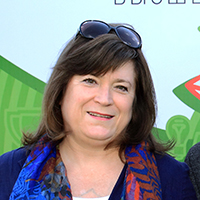Digital Culture and Media Literacy Centre to Open at HSE

The Centre will develop, research and promote themes related to media and information literacy and will become an online platform for discussing new transmedia and immersive practices in the digital environment. It will also continue work on creating various cultural and educational projects that has already been started by the HSE Faculty of Communications, Media, and Design.
Anna Kachkayeva, Professor at the HSE School of Media, who has been appointed the Centre Director, says the decision to create it at HSE has naturally evolved from a process that began in 2011 when the Faculty of Media Communications was established. In 2013, the Ministry of Education adopted a federal educational standard in Media Communications, and Media Literacy appeared as a subject for undergraduate students. Two years ago, HSE launched a minor in Media and Mass Communications, which has become one of the most popular among students.
In recent years, international universities have started launching digital culture laboratories and creative media centres that study issues of digital everyday life, new media practices, and information hygiene while promoting and studying new digital lifestyles. The HSE Digital Culture and Media Literacy Centre will become the first institution of this kind in Russia and will become part of the international context of developing global transmedia literacy.

Anna Kachkayeva,
Director of the Digital Culture and Media Literacy Centre
‘Immersion; augmented, mixed, and virtual realities; gamification and robotization; multichannel distribution and “alternative” journalism without editorial offices, publishers and websites; interactive VR cinema; digital history; social production and digital educational and charity poly- and meta-media. This is the reality of today’s cultural and media industries.
People today are almost a kind of media themselves. We are always online; our language is a new oral-written one; we create billons of digital images and media texts (selfies and Instagram stories). We are involved in media compassion via “the other” – digital self and digital friend (like/share/repost/emoji), in a ubiquitous game and digital interaction. The practice of digital expansion of people, events, and institutions is a practice of massive co-creation and massive production. This is storytelling in a very broad sense, when everything from museums, theatres, banks, and cities to search systems, universities, and non-profit organizations becomes storytellers and competes for narratives and interpretation. They fight for our involvement in the story and emotional inclusion, stimulating the culture of co-participation.
This is why the object of demand in the digital era is the human nature in people, which means that communication ability, creativity, critical thinking and teamwork are the main things we need to foster in ourselves regardless of our degrees, geography, professions, or generational digital gaps.’
For these reasons, the Centre is striving to become an interdisciplinary platform for digital media, media ecology and transmedia literacy. It will host workshops, academic conferences, including on an international scale (the next one is taking place from February 9-10, 2019), and will develop projects for cultural and educational organizations in Moscow and other Russian regions. Particular attention will be paid to studying media law and the challenges of digital freedom.
The educational programme offered by the HSE Digital Culture and Media Literacy Centre will be based on materials from UNESCO’s Information for All Programme (IFAP) and will use the experience of similar centres at international universities, school projects ‘Competently About News’ and ‘Understanding Media’, as well as original teaching and learning methods developed by the HSE Faculty of Communications, Media and Design. The Faculty has offered the master’s programmeTransmedia Production in Digital Industries
In 2018, with the support of the Vladimir Potanin Foundation, the master’s programme launched a museum specialization, a joint project with the Polytechnic Museum. Over the next three years, there are plans to adapt such master’s programmes for regional universities, which will become platforms for student production projects working jointly with cultural, educational and social institutions.
Anna Kachkayeva
See also:
American Professor Speaks with HSE Students Online about Media Imperialism
American professor Oliver Boyd-Barrett, author of the book Media Imperialism, one of the biggest studies of the contemporary media landscape, is among the international teachers recruited to deliver remote instruction at HSE University this year. His research interests include media, propaganda and international news agencies.
HSE Holds Storytelling Festival
On May 17-18, HSE’s Faculty of Communications, Media, and Design hosted its annual Telling Stories Fest in Moscow with the support of the Moscow Innovation Agency. In the festival’s first discussion forum, ‘Storytelling: How to Talk to Be Heard’, festival headliners and media industry experts shared personal stories of success as well as their thoughts on the future of storytelling.
Telling Stories Festival to Spotlight Current Global Media Trends
On May 17 and 18, the annual Telling Stories festival, organized by the Faculty of Communications, Media and Design, will take place in Moscow. Festival guests will be able to attend a public talk with a Hollywood director, learn how to create their own successful micromedia, see a theater performance by HSE students and much more. Entry to all of the festival events is free.
Telling Stories Festival to Be Organized by HSE for the Second Time
On May 17 and 18, 2019 the HSE Faculty of Communications, Media and Design is organizing its second annual Telling Stories festival. The event attracts renowned film directors, producers, photographers, curators of international projects, and trend-setting designers.
UNESCO Report on Global Press Freedom Presented at HSE
The presentation of UNESCO's report ‘Global Trends in Freedom of Expression and Mass Media Development’ was held at the Higher School of Economics. It was an opportunity to discuss journalism and the growing gap between traditional regulators and modern consumers of media.
Faculty of Communications, Media and Design: Projects and Plans
Iliya Kiriya, Deputy Dean of the Faculty of Communications, Media and Design, told The HSE Look readers about the Faculty’s current projects and plans.
Russian Businesses Underutilise New Media
Russian businesses have been slow in adopting new media tools. Many companies continue to rely on official websites to reach out to customers and avoid using social media and blogs, as they are not ready for an equal dialogue with external audiences, according to Iosif Dzyaloshinsky and Maria Pilgun, professors of the HSE Faculty of Communication, Media and Design.
The Olympics, the World Cup, FIFA, Global Media Events and Social Commotion
Renira Gambarato is Assistant Professor at the Faculty of Communications, Media and Design,School of Media. Originally from Brazil, Renira has been at HSE since 2013. She talked to Anna Chernyakhovskaya of the HSE English News Service about her experience of adjusting to living and working as an academic in Russia and about her joint project with HSE and Brazilian researchers on media convergence of global sporting events and opportunities to air feelings of social injustice.
Communications and Life
Teachers from the HSE Faculty of Communications, Media and Design spoke at the annual International Association of Communications Conference, Communication Across the Life Span.
Russia and Brazil: Studying Global Media Together
A group from Brazil’s Universidade Federal de Minas Gerais visited the HSE to participate in a seminar that was part of the ‘Russia-Brazil Major Sport Events: Social Commotion in Global Media’ joint project.


